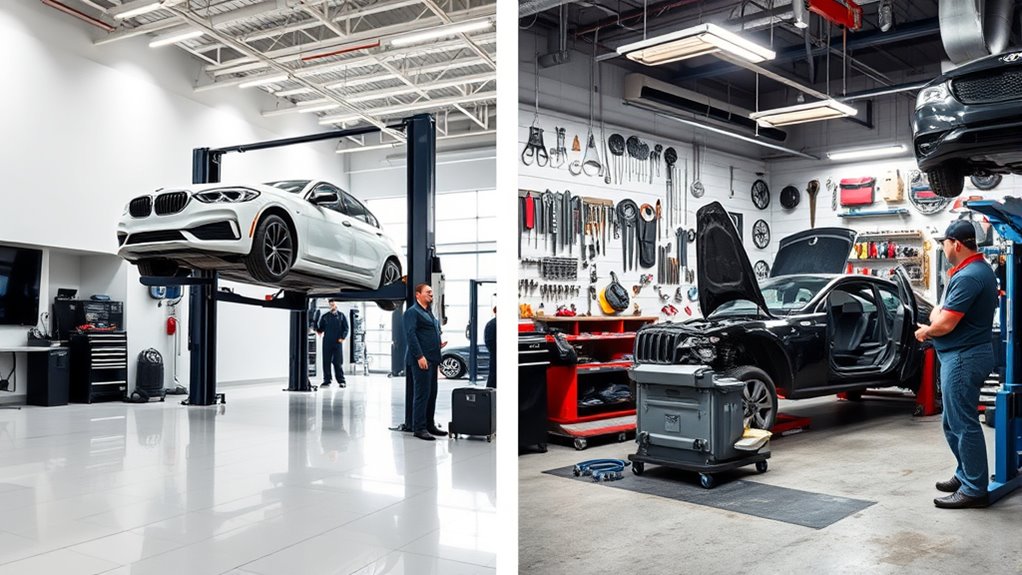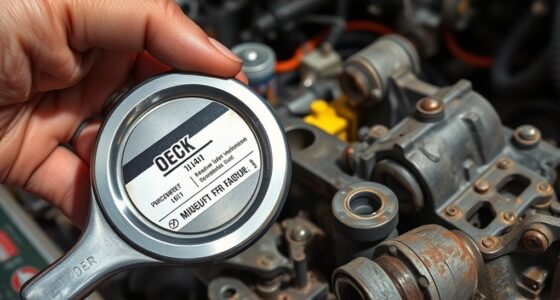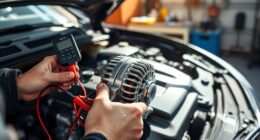When comparing dealer service centers to independent shops, you’ll find that dealerships typically charge higher labor rates because of specialized training, OEM parts, and warranty coverage. Independent shops usually offer lower prices due to reduced overhead and broader expertise across various makes and models. While dealerships might cost more upfront, they often provide better warranty protection. To discover which option saves you more without sacrificing quality, check the detailed differences that follow.
Key Takeaways
- Dealerships typically charge higher labor rates due to specialized training and OEM parts.
- Independent shops often offer lower prices because of reduced overhead costs.
- Warranty coverage at dealerships can offset higher costs for repairs covered under manufacturer warranty.
- Independent mechanics generally provide competitive pricing without sacrificing repair quality.
- The choice depends on whether warranty benefits or cost savings are the primary priority.

When it comes to vehicle repairs and maintenance, choosing between dealer service centers and independent shops can feel overwhelming. One of the first considerations is how warranty coverage influences your decision. Dealer service centers often include warranty coverage for repairs and parts, especially if your vehicle is still under manufacturer warranty. This means you might pay less out of pocket for certain repairs, and you can rest assured that the work is backed by your vehicle’s warranty. Independent shops, on the other hand, typically don’t offer the same warranty coverage as dealerships, though they might provide their own warranties on parts and labor. If warranty coverage is a priority for you, visiting a dealer could save you money in the long run, especially for major repairs covered under warranty terms.
Service expertise is another vital factor. Dealership technicians usually receive specialized training directly from the manufacturer, giving them an edge in understanding your specific vehicle model. They often have access to the latest service bulletins, technical updates, and specialized tools tailored to your make and model. This can translate into faster diagnostics and repairs, minimizing your vehicle’s downtime. Conversely, independent shops employ experienced mechanics who often possess broad expertise across various makes and models. While they may not always have the latest manufacturer-specific training, many independent mechanics are highly skilled and can perform quality repairs at a lower cost. The decision hinges on whether you value the dealership’s manufacturer-specific expertise or prefer a potentially more personalized and cost-effective service from an independent shop.
Cost differences often stem from the level of service expertise and warranty coverage. Dealerships tend to charge higher labor rates, partly because of their specialized training and access to original equipment manufacturer (OEM) parts. Independent shops usually have lower overhead costs, allowing them to offer competitive pricing without compromising quality. If you’re comfortable with the warranty coverage offered by the dealership and prefer a service experience backed by manufacturer training, paying a premium might be justified. However, if you’re looking to save money and are confident in the skills of independent mechanics, you can often get comparable repairs at a considerably lower cost.
Additionally, tent camping locations in New England are often situated near natural attractions, making the experience more enjoyable and immersive. Ultimately, your choice between dealer service and independent shops depends on your priorities. If warranty coverage and manufacturer-specific expertise are essential, a dealer might be worth the extra expense. But if affordability and personalized service matter more, independent shops can provide high-quality repairs without breaking the bank. Weighing these factors carefully can help you make the best decision for your vehicle and your budget.
Frequently Asked Questions
How Do Warranty Coverages Differ Between Dealers and Independent Shops?
You’ll find that warranty policies at dealerships often offer more extensive coverage, especially for parts and repairs, thanks to better access to original parts availability. Independent shops might have limited warranty options and may use aftermarket parts, which can affect coverage. Typically, dealerships honor warranties more fully and quickly because they keep parts readily available, ensuring your repairs are covered without delays or extra costs.
What Is the Typical Turnaround Time for Repairs at Each Type of Shop?
While it might seem like repair wait times are always lengthy, scheduling appointments can substantially reduce your wait at both dealer and independent shops. Typically, dealers have more streamlined processes, often completing repairs in a day or two, especially for warranty-covered work. Independent shops might take a bit longer due to varied workloads, but flexible scheduling usually helps you get your vehicle back quickly. Overall, appointment planning is key to minimizing repair delays.
Are There Specific Services Only Available at Dealerships?
Dealerships often offer service exclusives that you can’t find at independent shops, such as specialized manufacturer certifications and access to proprietary parts. These services guarantee your vehicle gets the most accurate repairs aligned with the manufacturer’s standards. If you want the highest level of expertise and genuine parts, choosing a dealership provides benefits exclusive to their network, making it worth considering for specialized maintenance or complex repairs.
How Do Customer Satisfaction Ratings Compare Between Dealer and Independent Shops?
Customer satisfaction ratings often favor independent shops because they tend to offer more personalized service, fostering customer loyalty. You might find service consistency at dealerships, but independents frequently excel in building strong relationships, leading to higher satisfaction. Ultimately, your experience depends on your expectations; some prefer the reliability of dealer service, while others value the friendly, consistent care provided by independent shops.
Do Independent Shops Use OEM Parts or Aftermarket Parts?
When it comes to parts, independent shops often use aftermarket parts, but some do offer OEM parts if you ask. You have to watch your step, as not all shops are the same; some prioritize cost-cutting, which might mean aftermarket parts. However, many independent mechanics do stock OEM parts to keep quality high and customer trust intact. So, it’s best to clarify your preferences before work begins.
Conclusion
When choosing between dealer service and independent shops, consider your budget and the quality you expect. Independent shops often offer lower prices and personalized care, but dealers might provide specialized expertise and genuine parts. So, do you value cost savings over brand-specific service? Ultimately, it’s about what matters most to you—affordability or peace of mind. Whichever you choose, make sure it aligns with your needs and keeps your vehicle running smoothly.









